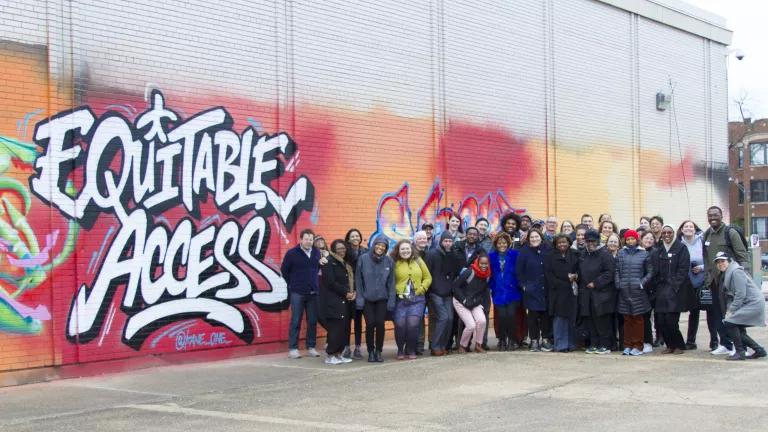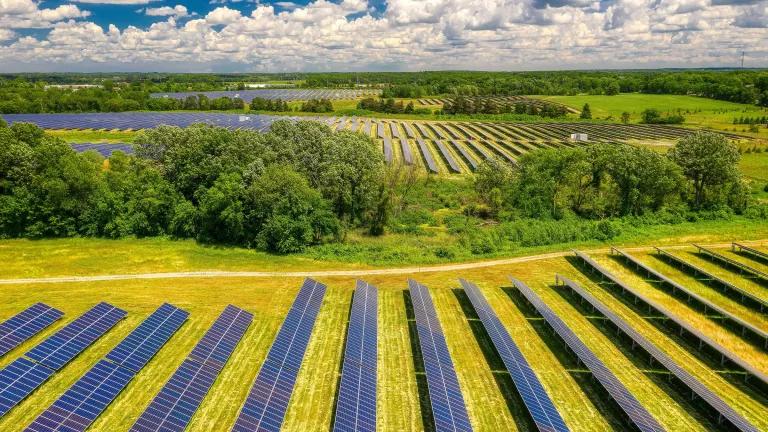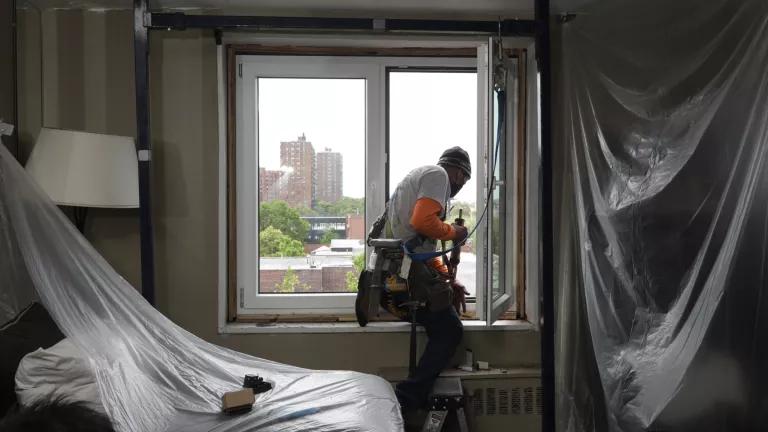High-Quality Jobs Help Protect the Planet
The coronavirus pandemic has illustrated the drastic inequities in our society, and it’s decimated the workforce across the board. More than 20 million people are unemployed, most of them Black and Latino. Losses through June exceeded 400,000 jobs across the clean energy sector alone. Fortunately, the House Select Committee’s report for acting on climate provides recommendations for smart and inclusive solutions to get people back to work and building a lower-carbon economy.

The coronavirus pandemic has illustrated the drastic inequities in our society, and it’s decimated the workforce across the board. More than 20 million people are unemployed, most of them Black and Latino. Losses through June exceeded 500,000 jobs across the clean energy sector alone. Fortunately, the House Select Committee’s report for acting on climate provides recommendations for smart and inclusive solutions to get people back to work and building a lower-carbon economy.
The events of the past few months have brought into stark focus that racial justice, economic equality, public health, and climate action are closely linked. Long-standing racism and environmental injustices have put both our most vulnerable communities at risk and demonstrated that our nation needs to do a better job of supporting populations living with environmental pollution and economic disadvantages that makes them vulnerable. We also need to provide ongoing support to those whose jobs have been affected, include worker protections in federal stimulus packages, and stand in solidarity with our labor and environmental justice partners.
In that spirit, the Committee’s report puts us on the path to reducing the pollution that’s driving climate change and health threats that disproportionately affect vulnerable communities. The report recommends driving down these emissions to zero by 2050 in a way that benefits all communities and begins addressing the historic underinvestment and disproportionate exposure to pollution (and related health impacts) faced by Black, Latino, Indigenous, and other communities of color.
Workforce as a Pillar
Investing in America’s workers and building a fairer economy is the 5th pillar of the report, and it contains several building blocks that are a strong start to make sure workers benefit from the shift to a cleaner energy economy and that no worker or community gets left behind in the transition.
The Committee recognizes that one of the best ways to address these systemic inequities is to create high-quality jobs (such as those providing family-sustaining wages, benefits, a career path, and a safe work environment) that are available to all. We cannot assume a shift to a cleaner economy will automatically lead to higher-quality jobs than they replace. Indeed, if we are not diligent this shift could reinforce inequities rather than reverse them. That’s why we need policies that empower workers to demand better jobs as well as require employers who receive public dollars to abide by certain workforce requirements.

National Renewable Energy Laboratory intern Anthony Nicholson measures the voltage of a solar cell using a lock in amplifier at a lab in the Solar Energy Research Facility.
Invest in Opportunities to Build the Workforce
If we are to have better jobs in this country, we first need to create more opportunities. The Committee report recognizes this and recommends reinvesting in infrastructure and the manufacturing sector, which was depleted over the last 30 years of international growth. Rebuilding our electrical grid, water infrastructure, and transportation networks to reduce emissions and make them more resilient to the climate crisis will provide millions of new high-quality jobs. So will building the components for these upgrades, and those needed for clean energy technologies, energy efficient buildings, and next-generation clean vehicles built here in the United States. These are opportunities and pathways for creating more high-quality jobs for workers.
By supporting policies that direct large amounts of federal investment into these technologies—especially to areas most in need, such as rural and deindustrialized areas, low-income communities, and communities of color—the Committee’s recommendations could help the U.S. become the global leader and make sure the benefits of that leadership are enjoyed by communities that have traditionally been left behind.
Ensure High-Quality Jobs
After establishing a framework for creating more jobs, the Committee also recommends policies to help ensure those jobs are high quality. One proposal is to pass bills, like the PRO (Protecting the Right to Organize) Act, that would help secure workers’ right to organize a union. This may come as a surprise to some as it might seem unrelated to climate change, but collective bargaining could have the greatest impact on creating a new economy that is better for workers while scaling up our economy-wide efforts to combat the climate crisis.
The reason is this: When workers are organized, they have more power than they would alone, and organizing in the first half of the 20th century fought for the employment, workplace safety, and personal safety laws many of us take for granted today. Workers today face a wall of opposition to successful organizing but if access to their rights were restored, they could bargain for action on a variety of fronts, such as demanding action from employers on climate change alongside pushing for higher wages, better benefits, and safer workplaces. Fair access to their right to organize also could help the clean energy industry scale up high-quality jobs across the board.
The Committee also proposes that federal funding be tied to workplace or employment requirements that make jobs safe and family sustaining, such as:
- A safe and healthy work environment, including safety standards needed for the climate change era (e.g., an OSHA heat safety standard).
- Project labor agreements and prevailing wage requirements that set minimum pay and job quality standards.
- Community benefits agreements so that benefits are equitably distributed.
- Tax policy as another vehicle to create high-quality jobs (e.g., Good Jobs for 21st Century Energy Act).
- Compliance with all labor, environmental, and civil rights statutes.
- “Buy American” provisions that build demand for a production workforce.
These concepts have successfully been applied in several areas of federal work and can be expanded to ensure federal dollars are helping to meet our societal goals as well.
Community-Driven Solutions
The downturn in the coal industry, and the anticipated drop in demand for oil and gas, present a critical transition and opportunity for communities that rely on these industries for jobs and tax revenue. It is imperative that there be plans for just, equitable, and community-driven opportunities in the shift to cleaner energy resources.
The Committee report anticipates and plans for this transition, appearing to be aligned with the recently announced National Economic Transition Platform. The report proposes a National Economic Transition Office that will work on providing federal economic and workforce development assistance to communities and workers. The Committee presents multiple opportunities to support a just and equitable transition, including:
- Community-driven and inclusive stakeholder processes to give all those who are impacted an equal voice in decision-making.
- Support for workers, including wage replacement, health care support (especially for coal miners and their families), robust paid retraining opportunities and job placement assistance tied to high-quality employment, as well as support for people who lost their job such as counseling, financial planning, and mental health support.
- Capacity building for local leaders to enable community leaders to lead their economic and community transition.
- Resources to replace tax revenue to maintain services, such as for fire departments as well as for schools and social services.
- A grant program to support economic diversification planning and implementation while making sure that the transition benefits all citizens of the community or region.
- Coordinated training programs and expanded apprenticeship programs to build the supply of workers needed for a clean energy transition.
- Opportunities to reclaim natural landscapes through conservation projects on unused coal mines and abandoned oil wells.

SAJE (Strategic Actions for a Just Economy) Community meeting for 100% California Campaign
Camille Seaman/Solutions Project
Building this new economy in a way that ensures racial and economic justice, improves health, and staves off climate change will have its challenges. But the Committee rightly recognizes that a holistic approach to rebuilding communities and protecting workers is needed. Without the right policies, workers could end up being left behind. As such, the Committee’s report integrates lessons-learned and puts this country on a path forward toward bold action needed to build back in an equitable and inclusive way. This way, everyone will enjoy energy and transportation options that are affordable and sustainable, as well as clean air, healthy and comfortable living environments, and access to high-quality jobs.




